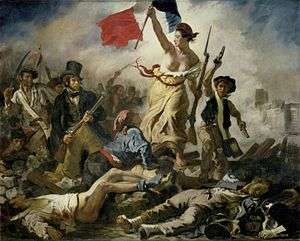Revolutionary
A revolutionary is a person who either participates in, or advocates a revolution.[1] Also, when used as an adjective, the term revolutionary refers to something that has a major, sudden impact on society or on some aspect of human endeavor.
Definition
The term—both as a noun and adjective—is usually applied to the field of politics, and is occasionally used in the context of science, invention or art. In politics, a revolutionary is someone who supports abrupt, rapid, and drastic change, while a reformist is someone who supports more gradual and incremental change. A conservative is someone who generally opposes such changes. A reactionary is someone who wants things to go back to the way they were before the change has happened.
Revolution and ideology
According to sociologist James Chowning Davies, political revolutionaries may be classified in two ways:
- According to the goals of the revolution they propose. Usually, these goals are part of a certain ideology. In theory, each ideology could generate its own brand of revolutionaries. In practice, most political revolutionaries have been either anarchists, communists, or socialists.
- According to the methods they propose to use. This divides revolutionaries in two broad groups: Those who advocate a violent revolution, and those who are pacifists.
The revolutionary anarchist Sergey Nechayev argued in Catechism of a Revolutionary:
"The revolutionary is a doomed man. He has no private interests, no affairs, sentiments, ties, property nor even a name of his own. His entire being is devoured by one purpose, one thought, one passion - the revolution. Heart and soul, not merely by word but by deed, he has severed every link with the social order and with the entire civilized world; with the laws, good manners, conventions, and morality of that world. He is its merciless enemy and continues to inhabit it with only one purpose - to destroy it."[2][3]
According to Che Guevara:[4] "At the risk of seeming ridiculous, let me say that the true revolutionary is guided by a great feeling of love. It is impossible to think of a true revolutionary lacking in this quality"[5][6]
According to the Marxist Internet Archive, a revolutionary "amplif[ies] the differences and conflicts caused by technological advances in society. Revolutionaries provoke differences and violently ram together contradictions within a society, overthrowing the government through the rising to power of the class they represent. After destructing the old order, revolutionaries help build a new government that adheres to the emerging social relationships that have been made possible by the advanced productive forces."
Revolutionaries may be terrorists, but there is no necessary overlap. Russian revolutionary Vladimir Lenin considered terrorism to be "destroying contact between the revolutionaries and the masses of the revolutionary classes of the population, and spreading both among the revolutionaries themselves and the population in general utterly distorted ideas of the aims and methods of struggle against the autocracy." In his controversial essay "Our Morals: The Ethics of Revolution",[7] the Marxist political theorist Norman Geras posited that terrorism should be rejected, but that violence could be justified in the case of extreme social injustice.[8]
See also
- American Revolution
- Armchair revolutionary
- Counter-revolutionary
- Counterculture of the 1960s
- Cuban Revolution
- Cultural Revolution
- French Revolution
- German Revolution of 1918–19
- Iranian Revolution
- Irish Revolution
- Mexican Revolution
- October Revolution
- Revolutionary movement
- Revolutionary movement for Indian independence
- Revolutionary socialism
- Revolutionary song
- Revolutionary terror
- Revolutionary wave
- Russian Revolution
- Spanish Revolution of 1936
- World revolution
- Xinhai Revolution
References
- "ARD Archived 2011-06-07 at Wikiwix
- Nechayev Archived 2008-10-18 at the Wayback Machine, Spartacus Educational website by John Simkin
- Sergey Nechayev (1869). The Revolutionary Catechism Archived 2017-02-06 at the Wayback Machine.
- Killer Images: Documentary Film, Memory and the Performance of Violence by Joram ten Brink, Joshua Oppenheimer, Columbia University Press, 2012, page 84
- "Socialism and Man in Cuba" Archived 2008-03-23 at the Wayback Machine A letter to Carlos Quijano, editor of Marcha, a weekly newspaper published in Montevideo, Uruguay; published as "From Algiers, for Marcha: The Cuban Revolution Today" by Che Guevara on March 12, 1965
- Guevara, Che. "Socialism and man in Cuba". www.marxists.org. Archived from the original on 10 August 2017. Retrieved 6 May 2018.
- Geras, Norman (1989). "Our Morals: The Ethics of Revolution". Socialist Register. Retrieved 16 November 2018.
- Eleni Courea (11 November 2018). "University alerts students to danger of leftwing essay". The Observer. Retrieved 16 November 2018.
External links
- Castro: Revolutionary as Celebrity - slideshow by LIFE magazine
